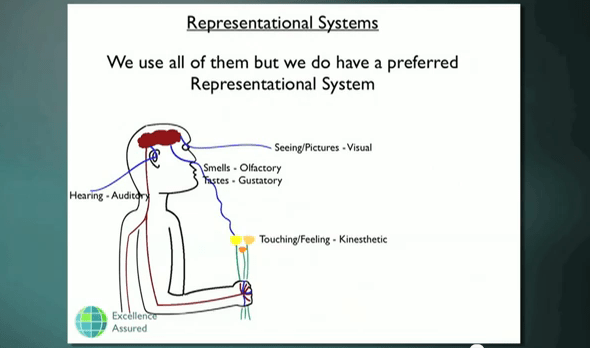Our Representational Systems are the internal systems that we have that “represent” to us the information that we take in through our senses. For example, we see a tree swaying in the wind, our visual representational system processes the image and helps us to store it as an image that we can recall at a later date. If you are in conversation with someone, then you are using your visual, auditory, kinesthetic representational systems to process the words that you are hearing, the tone of voice, the sights that you are seeing, what you are smelling, tasting and what you are feeling or touching. This is what we call an internal representation and it stays with us as a memory of the conversation.
If you think about a conversation that you had with someone in the past, then you can probably remember some of the words, maybe the tone of voice, how you felt about what the other person was saying, how it made you feel. You probably remember bits, but not all of the information that you gathered during this conversation. You may not recall, for example what you were smelling at the time of the conversation, even though we are smelling things all the time. Some of the information that we take in is deleted so that we may focus on the things that our brain thinks are important to us. Smelling things during a conversation is not necessarily something that may seem particularly important, so we delete it.
We each have a preferred representational system. For some of us it is visual, for others it is kinesthetic, and for others it is auditory. This is described in NLP as our Lead Representational System.
This is our preferred means of bringing things into our conscious thoughts. It leads the information out from the unconscious to the conscious.
How do you detect it?
- Think back to your last holiday. What came first, a picture, a sound, a feeling?
- Watching someones eye patterns can also reveal their lead representational system.
Just by looking at someone or listening to their words you can discover their preferred representational system, this can be really useful as you can mould your communication to suit their preference and therefore gain an unconscious influence over them.
Discovering and learning about Representational Systems forms a major part of our NLP training courses and you can learn about them now through our programmes.

